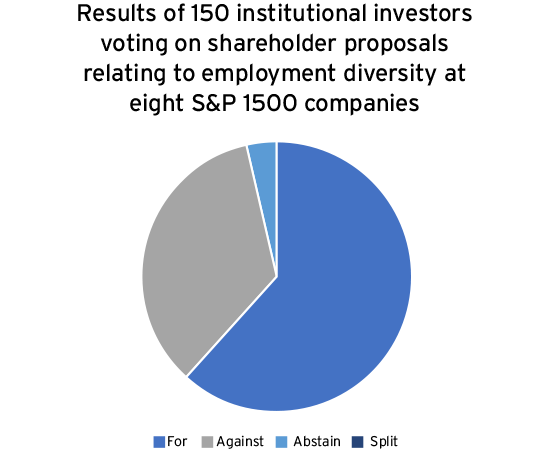Recent years have seen investors increase their focus on workplace diversity at all levels of a corporation as a matter of good corporate governance and a driver of business performance. Research on the subject suggests that companies with diverse workforces can better attract, develop and retain talent, and make better decisions[1]. Here we'll take a look at gender diversity and the different roles women can and should hold within the corporate world.
Board diversity
As outlined in Georgeson's 2018 Annual Corporate Governance Review, we saw an uptick in shareholder proposals regarding board diversity in the 2018 proxy season. Of 11 shareholder proposals related to board and/or employment diversity that were the subject of a shareholder vote in 2019, one received majority support. A majority of the top U.S. institutional investors by AUM voted in favor of some or all related proposals in 2018.
A number of organizations either have incorporated, or are in the process of incorporating, board diversity requirements to create a board that's diverse in age, gender, race/ethnicity, background, experience and skills that will make better decisions about overseeing the company. To recap some noteworthy developments towards these goals:
- The New York City Comptroller, on behalf of the five New York City retirement systems, launched the Boardroom Accountability Project 2.0 in 2017, requesting that their 151 pension fund companies provide diversity information on their respective boards. More than half of these companies have since adopted better disclosure practices regarding board diversity.
- BlackRock, the world's largest asset manager, expects to see at least two women directors on every board. Failure to account for diversity on the board may cause BlackRock to recommend against the election of nominating/governance committee members.
- Vanguard is a member of the 30% Club, a global coalition that's working to increase female representation in boardrooms and leadership roles.
- State Street Global Advisors (SSGA), among the world's top five asset managers, expects boards to be comprised of at least one female director; if the board is not, SSGA may vote against the chair of the board's nominating and/or governance committee. Board diversity has been a focus for SSGA for a number of years. According to its policy, "a well-constituted board is fundamental to a well-governed company, with board diversity a core attribute of a board's quality."
- Institutional Shareholder Services (ISS) adopted a policy to generally recommend against or withhold from the chair of the nominating committee or other directors at companies with no formal nominating committee at companies lacking at least one female director on the board, with a one-year grace period. This policy will become effective for meeting on or after February 1, 2020 and will be applicable to companies in the Russell 3000 and the S&P 1500 indices.
- Glass Lewis has a policy stating that it will generally recommend voting against the chair of the nominating committee at a company with no female directors on the board.
- California passed a law that requires publicly traded companies headquartered in the state to include at least one female on their boards of directors by the end of 2019. By the end of 2021, a minimum of two females must sit on boards with five directors, and three females on boards with six or more directors.
Management diversity
According to the International Labor Organization's (ILO) 2019 report, Women in Business and Management: The business case for change, of approximately 13,000 organizations surveyed across the world, over 58% reported that on average, women hold fewer than 30% of top executive positions. Those percentages decline the higher the management level rises. Their research also shows that "when top executive positions and boards are diverse, this helps more women into middle and senior management positions, reduces occupational gender segregation and creates a more inclusive workplace environment overall".
Some companies are taking it upon themselves to implement executive management diversity, policies. In 2016 Microsoft began to include diversity goals into their executive compensation structures. A diverse management team, like a diverse board, can generate different opinions, ideas, and solutions.
Overall workplace diversity
The ILO report further demonstrate the importance of overall workplace diversity, noting that 57.4% of respondents agreed that gender diversity initiatives improve business outcomes; and 60.2% reported increased profits and productivity.
Workplace diversity at all levels is also a topic of importance to investors. Georgeson's 2018 Annual Corporate Governance Review includes a summary of Institutional Investor Voting Data of Select Employment Diversity Shareholder Proposals. Of the votes cast, the majority of investors are in favor of companies providing information on diversity reporting, demonstrating how investors' voting policies have evolved over time.
Talent development
These shifting workforce needs, and evolving governance best practices have led companies to reevaluate talent development programs in order to retain and attract the human capital that will drive the business forward.
Comprehensive training programs can help enable a company to develop a diverse talent pool, potentially from within its organization. But whether promoting from within, or hiring from outside, companies should provide programs that will help their workforce with career advancement. And the more women candidates that are offered opportunities to participate in these programs, will hopefully result in more women serving in senior roles, management roles, and as company board members.
Companies are also implementing diversity and inclusion training programs and supporting mentorship and sponsorship within the organization. Within my organization, the Computershare Women4Women (W4W) network was launched in 2018. The W4W network aims to foster gender diversity by cultivating leadership and career opportunities, providing access to valuable mentorships, information about upcoming women's events, and recent news related to women in the workplace. Through the network's coordinated efforts, employees are encouraged to examine the unique experiences and demands women encounter in the workplace, and to share organizational knowledge and experiences in order to support career development and growth.
If you have questions or comments, please email info@georgeson.com or call 212 440 9800.
[1] https://workplacediversity.com/news/Why-is-Diversity-Important-in-Recruiting-and-Retention